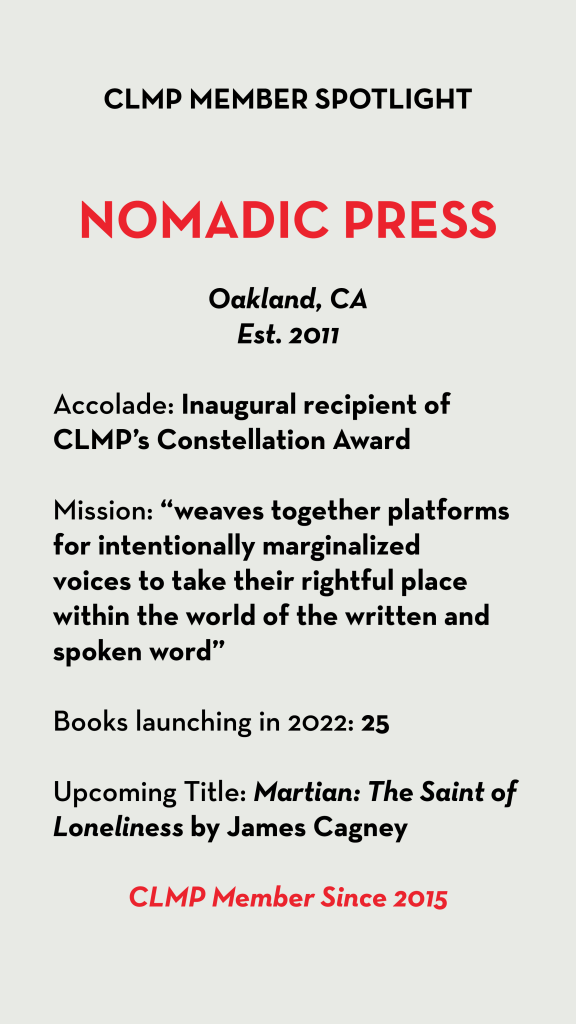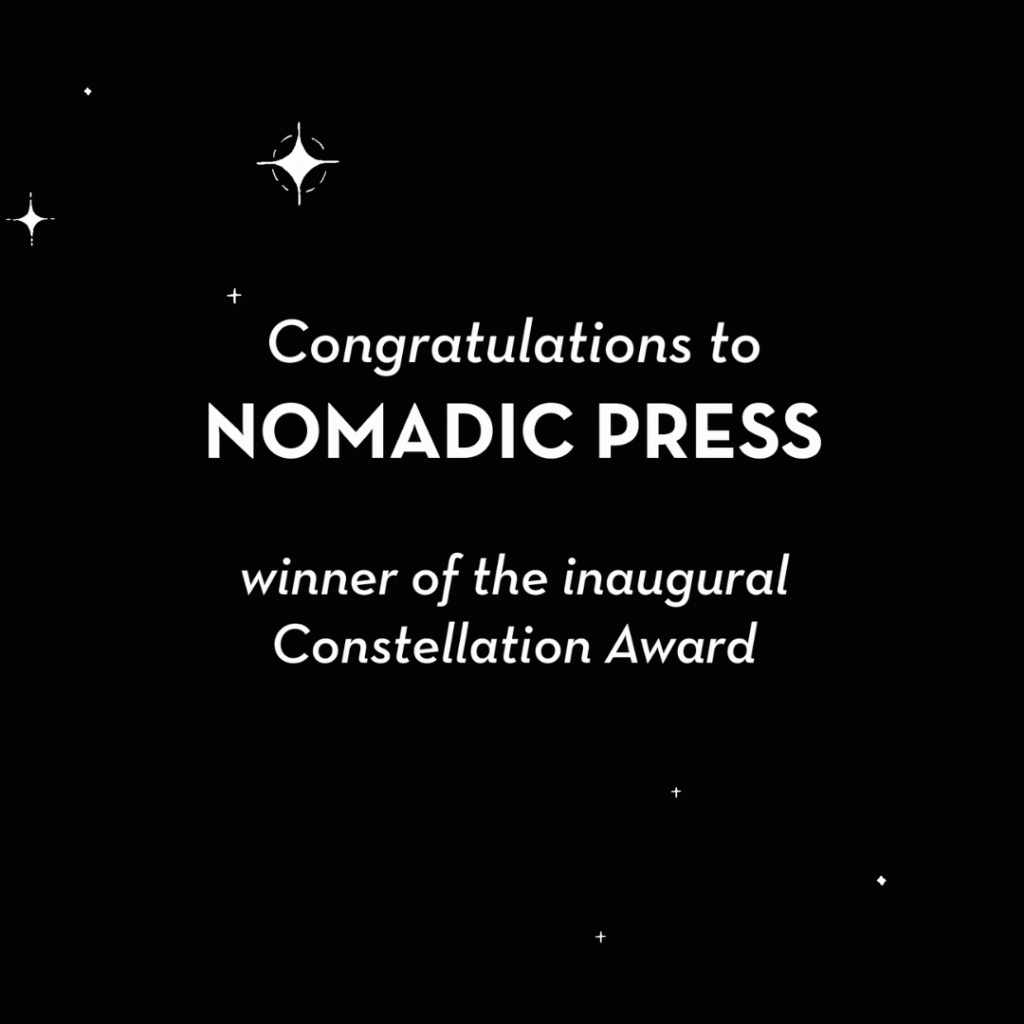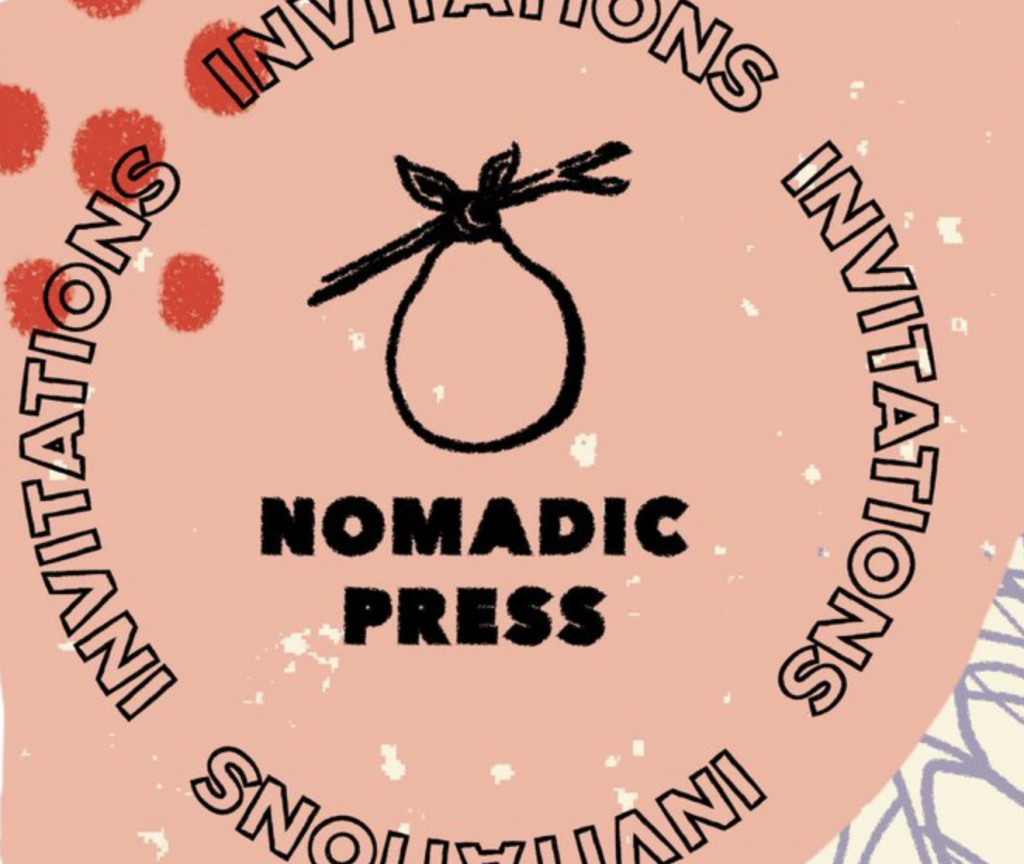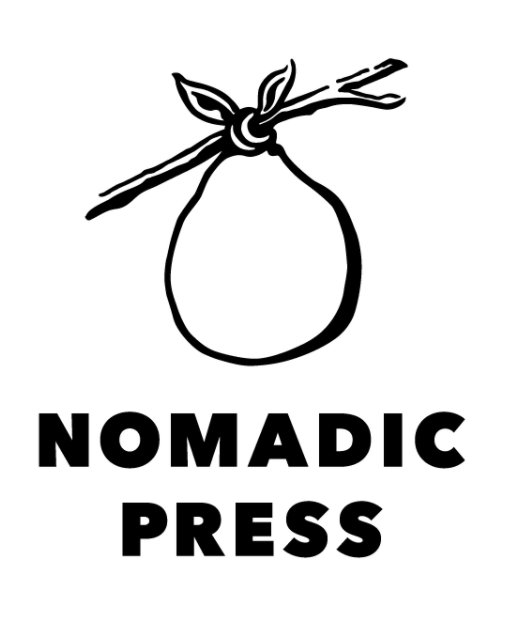Nomadic Press is the recipient of CLMP’s inaugural Constellation Award, given to honor an independent literary press that is led by and/or champions the writing of people of color, including Black, Indigenous, Latinx, and Asian American & Pacific Islander (AAPI) individuals, for excellence in publishing.
We spoke with J. K. Fowler, founder and executive director of Nomadic Press, in this special spotlight.
What is the history behind Nomadic Press? When was it founded and what is its mission?
 Nomadic Press was started in 2011, and we had no idea what we were doing. It’s important to be real about that—that it’s okay to not exactly know the how. We are in some ways self-taught through trial and lesson and we have necessarily learned from those who have come before us and those who have joined us along the way. Many of us went through the academic machinery, and so there is a mixed bag of backgrounds in art, anthropology, sociology, political theory, writing, you name it. Recovering academics. And you see this variety of backgrounds in the works that we publish. Yes, we have published folks with MFAs or PhDs. Yes, we have published folks who started working and raising a family right after high school or took another path of learning/exploration. No matter the path, we always welcome the invitation to connect.
Nomadic Press was started in 2011, and we had no idea what we were doing. It’s important to be real about that—that it’s okay to not exactly know the how. We are in some ways self-taught through trial and lesson and we have necessarily learned from those who have come before us and those who have joined us along the way. Many of us went through the academic machinery, and so there is a mixed bag of backgrounds in art, anthropology, sociology, political theory, writing, you name it. Recovering academics. And you see this variety of backgrounds in the works that we publish. Yes, we have published folks with MFAs or PhDs. Yes, we have published folks who started working and raising a family right after high school or took another path of learning/exploration. No matter the path, we always welcome the invitation to connect.
When we started, we did have a number of different undercurrents beneath the emergence of Nomadic Press: a desire for integrated community, for chosen family, for a place to safely explore and be who we needed to be (as beautifully messy as that might be at times), and for spaces that reflected our many selves.
In the 10 years since, what I’ve come to appreciate is how all of us come to this work to heal—in different ways, at different parts of the journey (including that part of the journey where we don’t even realize we’re on the journey and might even be strongly resistant to the idea). There is a dance on different planes of existence between the projected personality (and all of those associated levels where we project who we think we are and then ask others to “buy in” and reflect that back to us in many ways) and the soul, which touches on a more universal and connective current of flow.
In all of our books and events, a vibe of transformation (or longing for transformation) can be felt. Sometimes that longing comes out as a messy scream, sometimes it comes out in the form of vulnerable, softer energy. Sometimes it’s hidden under layers of protection, sometimes it comes as an in-your-face reckoning. There is no one right way to heal, and we all come to this work of healing with our own karmic configurations and some of us have been at this for many incarnations. In so many ways art is the work of mirrors and projection—projecting the personality, viewing the personality reflected back, and on a different plane, the soul current where the work remains on a whole other level. Ultimately, it’s the return inward to the personal transformation and evolution that leads to revolution.
 Folks ask what we look for in our writers. Authenticity. Alignment with core. Writing that aims to further connection. Commitment to community engagement, to something larger than ourselves. A desire to work toward change on a personal level and in our communities. We all get caught in the personality game (I think that’s just part of being human), and what I love about our writers is that we can play on that level, while we also work on a whole other level that offers a commitment to bettering self and our constituent communities, which are truly diverse and deep. We all carry trauma (some of us more than others), and lots of nonprofits and other organizations have been talking about trauma-informed leadership for some time now. I think it’s important to utilize the trauma-informed lens with ourselves and in our daily lives, not just our offices, and most definitely in community art work where so many of us are drawn to creative pursuits through a desire to heal and transform ourselves and our communities.
Folks ask what we look for in our writers. Authenticity. Alignment with core. Writing that aims to further connection. Commitment to community engagement, to something larger than ourselves. A desire to work toward change on a personal level and in our communities. We all get caught in the personality game (I think that’s just part of being human), and what I love about our writers is that we can play on that level, while we also work on a whole other level that offers a commitment to bettering self and our constituent communities, which are truly diverse and deep. We all carry trauma (some of us more than others), and lots of nonprofits and other organizations have been talking about trauma-informed leadership for some time now. I think it’s important to utilize the trauma-informed lens with ourselves and in our daily lives, not just our offices, and most definitely in community art work where so many of us are drawn to creative pursuits through a desire to heal and transform ourselves and our communities.
In this work, righteousness can sneak in and righteousness is a tricky one. It’s clear that righteousness is not the path to the universal flow and in fact separates us from the very thing we are seeking, and the world is full of suffering and we are human, all too human. So there’s a struggle here, and you’ll see this within our work at times.
How do you work to foster community engagement and to stimulate conversation across artistic disciplines?
I’m going to toy with your question slightly if that’s okay. It feels important to sit with/in the complications of conceptions of art and community. What constitutes these concepts, how they are built, if they exist at all and/or how, the myriad ways in which these terms are understood. On one level, yes: we weave together live musicians and poets, visual artists and dancers. On another level, we’re all trying to speak from and to something beyond the categories to a more universal—flow, spirit, Tao, path, Allah, God—whatever one is comfortable assigning to it. So on this level, we are all in constant communication. It is a felt experience, not so much an intellectual one.
I think where we get caught as humans at times is in identification with the projections of personality and category. That’s a game built to separate, sometimes from a place of boundary work, sometimes with animus—there are numerous different intentions behind the constructed separation. So once all of that drops away (while still honoring its presence in how it leaks in and shows itself), what’s the conversation? That’s the ripe question for us.
Throughout your website, Nomadic Press favors the word invitation in lieu of submission. (Invitations are open through February 28, 2022.) What is the significance of this adapted language, and how does it reflect your mission as a press?
 To state the obvious to a room full of writers/publishers, language matters, and submission is a potentially intense word that can evoke energetic separation, a submission to, or hierarchy. Not everyone will agree with this, and there is plenty of room for differences of opinion. But language only operates on one level. So change that, play with that—yes. But don’t stop there. The work is to play with the language while simultaneously tilling the soil for new things to grow, emerge. And so we continue the work while also leaving space for us all to be human and enmeshed in deeply entrenched systems that work at separating, categorizing, and harming. What is the language that expresses our intentions and where we long to move from? Invitation feels aligned in this particular instance.
To state the obvious to a room full of writers/publishers, language matters, and submission is a potentially intense word that can evoke energetic separation, a submission to, or hierarchy. Not everyone will agree with this, and there is plenty of room for differences of opinion. But language only operates on one level. So change that, play with that—yes. But don’t stop there. The work is to play with the language while simultaneously tilling the soil for new things to grow, emerge. And so we continue the work while also leaving space for us all to be human and enmeshed in deeply entrenched systems that work at separating, categorizing, and harming. What is the language that expresses our intentions and where we long to move from? Invitation feels aligned in this particular instance.
In the midst of this monumentally disruptive and transformational pandemic, and beyond-yet-through language, the lingual step-aside (in/voluntary) is allowing for new languages to be crafted/heard, new eyes to cast visions of brighter futures. Yet old systems remain and outdated worldviews persist. So we’re in the midst of this dance between the old and new—an old that doesn’t know it’s old or does and sits in terror and a new that is twirling into the unknown. This is complicatedly beautiful.
Nomadic Press is the inaugural winner of the Constellation Award, launched in 2021 to honor an independent literary press that is led by and/or champions the writing of people of color. Can you tell us what receiving this prize means to you as a press, and what the $10,000 will help you accomplish?
 First and foremost, any recognition on this level from our peers means a great deal. To also be in company with such amazing presses means a lot. So there is much gratitude and much more work to be done. As a press, we work hard, and we will continue the work together. This injection of financial energy will help us keep doing what we do—and as many know, publishing is not cheap, so much of this will be spent on the production of the initial runs of 2022 books, of which there will be 25. We have a lot of exciting things in the works, so we are hopeful that 2022 will be a year of joy, abundance, healing, and sustainable growth for all of us who are in this work.
First and foremost, any recognition on this level from our peers means a great deal. To also be in company with such amazing presses means a lot. So there is much gratitude and much more work to be done. As a press, we work hard, and we will continue the work together. This injection of financial energy will help us keep doing what we do—and as many know, publishing is not cheap, so much of this will be spent on the production of the initial runs of 2022 books, of which there will be 25. We have a lot of exciting things in the works, so we are hopeful that 2022 will be a year of joy, abundance, healing, and sustainable growth for all of us who are in this work.
